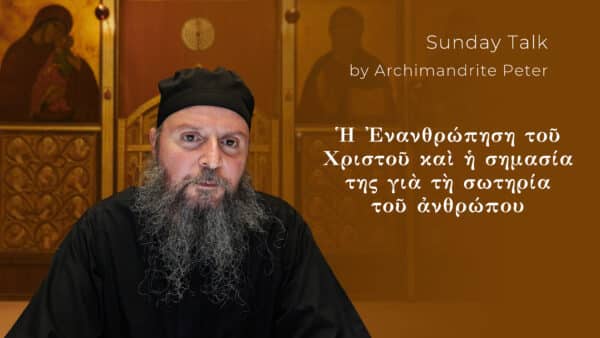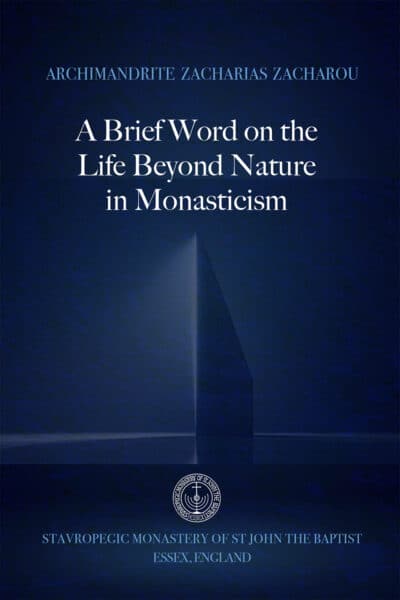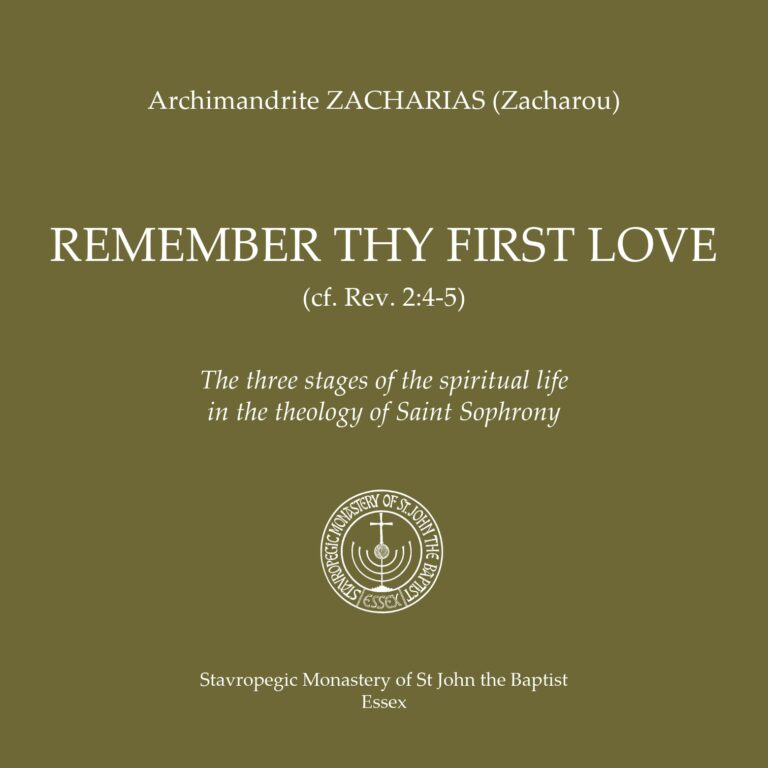Question: Why have they included marriage in the Sacraments of the Church, and not monasticism?
Answer: Fr Sophrony said to me once: ‘Imagine that they do not accept monasticism as a sacrament of the Church, and marriage is one of the sacraments!’ Both of them should be considered sacraments because this is the way of Christ. The icons, for example, are not a sacrament, but they are a very strong vehicle transmitting the grace of God to us. Maybe they have not included monasticism in the sacraments because the monks were humble and did not wish to force their way. But now, after 2000 years, we can dare to speak. Many people do not realise that monasticism is a real, all-embracing gift of the Holy Spirit, because although we cannot reach His measure, the most approximate imitation of Christ is to be found in monasticism and it is only possible through the Holy Spirit.
The Church really wanted marriage to be blessed probably for pastoral reasons, because it was a struggle to have an honourable marriage in that world which was just coming out of paganism. The Apostle says that this mystery is great in the Church.1See Eph. 5:32. He makes an effort to tell the Christians that the marriage is holy and the bed undefiled2Heb. 13:4. in order to strengthen them, but ‘in the Church’ – what does it mean? That is to say that there is this sublime unity with the Church in the Spirit, when that unity with Christ in the Church is not destroyed. However, the sublimity of monasticism cannot be compared. St Paul says: ‘I would that all men were even as I myself,’ that is to say, that he would like everybody to be a monk. ‘But every man hath his proper gift of God’,31 Cor. 7:7. he says, not all can have the gift of monasticism. And the Lord says: ‘He that hath ears to hear, let him hear’,4Mark 4:9. because not everybody can accommodate this. St Paul is exactly in the line of this teaching. Christ says that this is ‘for whom it is given’,5Matt. 19:11. it is a legacy that God gives to a person, foreseeing their response to the calling.
Question: Could not God have called St Paul before he persecuted the Christians and before St Stephen’s death? Was there maybe a providence so as to keep him humble, when he would become so great afterwards?
Answer: St Paul says: ‘I am the worst because I have persecuted the Church’,6Cf. 1 Cor. 15:9. ‘worse than an abortion’,7Cf. 1 Cor. 15:8. (Greek text), because he never forgot he had been a persecutor. Though morally he must have been in full integrity, he committed a crime: he participated in the killing of St Stephen, the first martyr.8See Acts 7:58. If this had happened nowadays, the Church would not have made him a priest, because he committed a murder. Like St Paul, Fr Sophrony was spotless in his life. Once he confessed to me that he had never fallen morally, not even in a minor way, and yet because he flirted with the religions of the East, for him this was like a betrayal and he repented for it all his life like mad. St John of the Ladder says that falls of this kind, in the faith or in the vision, can be restored much more quickly than moral falls. Yet we have examples in the history of the Church, in the lives of the Saints, which show us that true repentance overcomes any kind of fall and brings the grace of sanctification. It is said in ‘The Ladder’: ‘Who is more blessed, the one that has never fallen or the one that has fallen and got up again? Rather the second,’ he says, ‘in the image of Him Who died and was risen again.’9See Step 15:32.
The first evangelisation of Paul was the martyrdom of Stephen, who was praying for those who were stoning him. I am sure that this left a big imprint in St Paul’s heart and mind, so that, when the Lord spoke to him on the way to Damascus, it was easy for him to relate to His words. Stephen was a fantastic imitation of Christ soon after the Resurrection of Christ: he was the first martyr who died in exactly the same way as the Lord, praying for those who were killing him. ‘Lord, lay not this sin to their charge’ (Acts 7:60), St Stephen said, like the Lord prayed on the Cross: ‘Forgive them for they know not what they are doing.’10Luke 23:34. Also, before His death, the Lord said: ‘Ye shall see the Son of man sitting on the right hand of power’,11Mark 14:62. and we see that at his death, St Stephen says: ‘Behold, I see the heavens opened, and the Son of man standing on the right hand of God’,12Acts 7:56. as if confirming what Christ had said. St Stephen confirmed his confession through His very martyrdom.
Question: Why does the contemporary man find it hard to obey, and what can he derive from obedience?
Answer: When one chooses a monastery, one must have the eyes to see where the power of indestructible life is and not the outer form. Sometimes life may seem perfect on the outside, but inside there can be so many deviations and so much corruption which is unthinkable. For example, although the Studion, where St Symeon the New Theologian and his Elder Symeon the Pious lived, was open to the people of Constantinople in the middle of the city, there was yet such a sublimity of life. The criterion is not the outer form. Simplicity is important in monastic life, but it demands a greater conscience, we should be more strict with ourselves and be immediately ready, if we deviate a bit from the way, to put ourselves back on track. Then we keep the spirit and it is so beautiful because we experience this wholeness of humankind.
For Father Sophrony the number one activity of the Monastery was to make known the teaching of St Silouan. Towards the end he said once: ‘even mine’, but he was always saying: ‘the teaching of St Silouan.’ In monasticism you always ‘blame’ your Fathers and you guard your humility, it is the only way. That is why autonomy and independence is destructive because then you have no means to keep humility. As Scriptures say, our God is the God of our Fathers.13See Deut. 26:7, Acts 3:13. Those who are too strong in their self-will are too vulnerable to the passion of the flesh. It is not voluntarism which will save you from the passion of the flesh, but humility. If you are humble, if you confess sincerely and humbly, you will be strong. You will never suffer any harm. But if you think that you can do it yourself, you will crash very quickly. Also, those who manage to be obedient have a very rich life, whereas those who have a tendency to be independent remain enclosed in their little circle.
We cannot make progress without this relationship with our Elder. We read these things in the Desert Fathers, we hear them, but we do not register them. Yet, if we experience once the power of that which is behind these words, then we know, then we can speak like St Symeon the New Theologian, St Barsanuphius the Great or Fr Sophrony. Fr Sophrony was a very zealous monk, he was burning in the spirit, but his life was multiplied and confirmed from the moment he met St Silouan. That is how this life goes. You cannot just ‘suck it from your elbow’ as Fr Sophrony said to me once. We must make friends with the mammon of unrighteousness,14Luke 16:9. with those citizens in the upper Zion so that they may receive us. That is why Scripture says: ‘Blessed is he that has a seed in Sion, and household friends in Jerusalem.’15Isa. 31:9.
Question: When St Silouan says: ‘Keep your mind in hell and in your heart’, does it mean that your heart is the hell?
Answer: No. When you condemn yourself to hell, in order for it to ‘catch’, in order for it to be done with strength and bring fruit, that is to say remission of sins and contrition, you must bring your mind to your heart and say your prayer from there – then it is powerful. If you just mumble, you may even get something, but you only beat the air.
Question: So through the thought of condemning yourself to hell you enter into your heart?
Answer: You must condemn yourself from the heart, having your attention at your heart, even at the place of your physical heart – we do not all have union of mind and heart. But even if you bring your mind to the place where the heart is and condemn yourself with concentration from there, the prayer catches, it is strong. So, self-accusation and its extreme form of condemning oneself to hell is powerful when it is done from the heart. That is why St Silouan says, ‘Keep your mind in hell and in your heart.’ That is to say: ‘Condemn yourself as worthy of hell, but from your heart.’
Also, in the New Testament we hear that the invocation of the Name of our Lord Jesus Christ is very powerful, but ‘from a pure heart.’162 Tim. 2:22. Even St Symeon the New Theologian in his famous 30th Catechism recommends the monk to go to his cell, to tie his hands behind his back, lower his head and bring his mind even lower, further low into the heart, and start praying from there. He gives the beginning of the prayer and does not finish it, but adds, ‘and then say what the Lord will give you at that moment to continue the prayer’. Indeed, true repentance is a prophetic act. If we open our mouth in the desire to repent, we attract the Spirit of God,17Ps. 118:131 LXX. Who puts in our mouth a word of repentance that justifies us. This is why the Lord says: ‘When they take you to courts to witness for My name’s sake, to confess Me, do not premeditate what to say, for I will give you mouth and wisdom which your adversaries will not be able to gainsay.’18Cf. Luke 21:12-15.
The Lord speaks here about the witness before martyrdom. However, His word is also valid for our peaceful times, for the word of God is true for all ages and for all times, it will abide for ever.191 Pet. 1:25. For us it applies in this way: when we want to repent and we put ourselves before the judgment seat of Christ, desiring to accuse ourselves for all our mischievous living, He will give us a word and wisdom. That is to say, He will give us a prayer of repentance that will justify us and which our adversary will not be able to resist. As Fr Sophrony says, nobody can persecute a monk more than he persecutes himself in this act of repentance with self-accusation to the end. It is a prophetic act because if the monk puts himself in that situation before the Face of Christ and under the light of His Commandments, condemning himself to the end, then he becomes truthful and he attracts the Spirit of the Lord, the Spirit of truth, which gives him a mouth and wisdom that will justify him. ‘Prophetic’ means to be truthful, to be aligned with the Holy Spirit, to express the truth in terms that have an eternal value and remain for ever. People of God led by the Spirit have spoken to us the word of God.
Question: About ‘Keep your mind in hell and in the heart’, one cannot be prophetic unless one speaks from the heart. Is the prophetic spirit connected with the heart?
Answer: ‘In the heart’ means with all your being, because the heart is the centre of the being: if we speak from the heart, it means that all our being is there. Throughout the Scriptures this participation of the heart is demanded; we must believe with our heart, and then confess with our mouth unto salvation.20See Rom. 10:9-10. We must pray from our heart212 Tim. 2:22. and forgive from our heart.22Matt. 18:35. Everything we do must be from our heart and then it is recognised by God.
Question: We say that the ‘nous’ has the capacity to know God, but it seems that only the nous that is united with the heart has this capacity.
Answer: The first-created had this unity of mind and heart, it was only when they sinned that the ‘nous’ was separated from the heart. That is why we need many tears, because they have this property: a few drops and they change the heart. The heart becomes alive, inspired, warm, sweet, light and then it is easy to pray, the mind is there and from there it can speak to God. That is why tears are so amazing. Truly, they are the bread of the monk and of every Christian, and this is not an unknown mystery – all the Fathers spoke about it. St Gregory the Palamas’ treatises on hesychasm are really pure milk, but if you only read his letter to nun Xenia, there he expressed all his vision. There he speaks about tears. And St Isaac the Syrian says that those that keep the gift of tears are greater than the martyrs. Nobody will be able to bear the spirit of repentance without being destroyed unless tears accompany it, because tears bring also the comfort of the Holy Spirit and the heart is kept strong to live through the pain of repentance. Without tears man will collapse before the great fire of repentance.
Question: Do you mean that he will fall in despair?
Answer: Even if he does not fall in despair, he will not survive. Tears are the oil that soothes the heart. Fr Sophrony says that when we weep, all the powers of our being participate in prayer and that is why it is more beneficial. Now the question is how to be prophetic in a world like ours that is so materialistic and everything tries to catch our mind, our attention, and our mobiles are in our pockets…
Question: Can you say something about the love of God?
Answer: There is nothing more holy and more powerful than the love of God and in order to come to the love of God, really, one must purify himself from every stain of sin. The love of God will not inhabit just anybody. Like with the vision of the uncreated Light, only those who are pure in heart can see it. If a man has such a vision, it means he has cleansed himself with fierce repentance for many years and that there is not one stain in him. Even that may not be enough, God might provide in His wisdom some trial in his life so that he may reach the threshold of death, the end of his existence. And when every human possibility is exhausted, then the Lord extends His hand. There where the human factor ends, the divine hand is extended to raise him up. You remember that story in ‘His Life Is Mine’23Arhcimandrite Sophrony Sakharov, His Life is Mine, pp. 56-57. where Fr Sophrony says that ‘There where science stops, theology begins.’ The love of God is so holy and when people are counted worthy to keep it, they become incorruptible. It is not just a certain euphoria, it is as if the heart sizzles to the end: like the fish is fried in a pan, so is the heart continually burning because of the love of Christ. Unless the love of Christ is like this, it cannot be that love about which St Paul wrote the hymn in the 13th chapter to the Corinthians.
Question: Although we do not see the uncreated Light in front of our eyes as the Saints, but can it be that it is this uncreated Light which gives a word in the heart?
Answer: There is a gradation, yes, even to have a little contrition and blame ourselves as sinners before God, asking Him to show mercy to us – this is also enlightenment, although a tiny measure. There are others who have a greater measure and they come to hate themselves as they are, not fully accommodated by the love of Christ. But in order to have a vision of that opening to the other world, for such a gift you must be perfected in love. In ‘We Shall See Him as He Is’,24Arhcimandrite Sophrony Sakharov, We Shall See Him as He Is, p. 158. Fr Sophrony says that in the Light, our spirit contemplates immeasurable horizons and gradually discovers more and more that is new in this luminous breakthrough into Heaven ‘where God is’:25Cf. Exod. 20:21. so beyond this opening into Heaven there is the Light of God.
Footnotes
- 1See Eph. 5:32.
- 2Heb. 13:4.
- 31 Cor. 7:7.
- 4Mark 4:9.
- 5Matt. 19:11.
- 6Cf. 1 Cor. 15:9.
- 7Cf. 1 Cor. 15:8.
- 8See Acts 7:58.
- 9See Step 15:32.
- 10Luke 23:34.
- 11Mark 14:62.
- 12Acts 7:56.
- 13See Deut. 26:7, Acts 3:13.
- 14Luke 16:9.
- 15Isa. 31:9.
- 162 Tim. 2:22.
- 17Ps. 118:131 LXX.
- 18Cf. Luke 21:12-15.
- 191 Pet. 1:25.
- 20See Rom. 10:9-10.
- 212 Tim. 2:22.
- 22Matt. 18:35.
- 23Arhcimandrite Sophrony Sakharov, His Life is Mine, pp. 56-57.
- 24Arhcimandrite Sophrony Sakharov, We Shall See Him as He Is, p. 158.
- 25Cf. Exod. 20:21.



